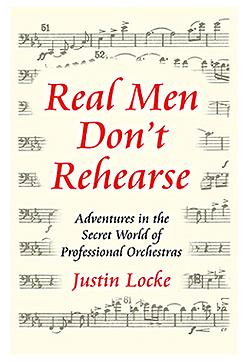When I started this whole “writing/speaking thing,” I had some rather grandiose notions of bestowing my rare artistic knowledge upon the masses. After all, I had seen various conductors running around the lecture circuit telling people how to be leaders and managers, and since I had actually dwelt in the world of major orchestras, I thought surely, people would be hanging on my every word… oh well, such is youth.
In embarking on this grand career change, I must confess, it was absolutely terrifying for me to step out of the safety of familiarity that I felt in the culture of the major orchestras and television productions. Given how horrifically stressful those jobs are, you would think I would be thrilled to go talk to people outside of it, but it was my “briar patch” and I felt very at home in that world. And when I stepped into the “9-to-5” world, I felt very much like a fish out of water. I quickly discovered that I simply did not speak the same language as these people.
However, scared as I was, I faced the fear and persevered (by the way, if I have any actual “talent,” that’s it.) And here are some of the things I learned:
When one makes a grand personal discovery/epiphany, it is very easy to think that you have invented something new, since you personally have never seen it before. What I have consistently found is, most of the things that I thought I invented or discovered have already been invented or discovered by someone else.
For example, I was shocked to discover that the highly efficient approach that I developed (entirely on my own, and the complete conflict with the standard approaches I was being taught) for learning how to play the bass with the least amount of energy possible, was simply a variation on “Toyota lean manufacturing.”
Another example, I was talking to an MIT engineering graduate the other day, and he was reading some book about innovation (by Kelley I think), and I said something about how I found it to be more inspirational to have to deal with limited resources. Even though this is an idea/observation that I came up with entirely on my own in my work as a playwright, he came back with some scholarly sounding phrase that basically just repeated the same concept.*
At this point in such conversations, it is easy to get sidetracked into an argument over whose label is better. We are, of course, proud and possessive of our thoughts and discoveries, and we are of course easily threatened by the idea that someone else’s “stealing them.” Nations have gone to war over labels.
There is a common industrial approach to creative thinking, which is to monetize it by patenting it and claiming you’re the guy who invented this great new thing. If you have the marketing muscle/energy, I suppose this is a reasonable approach. But if I, you, or any other creative/future vision thinker is going to have any effect, we have to stop thinking in terms of claiming ownership of our labels and phraseology of these concepts, and instead figure out how we can create a common language and vocabulary for a more artistic, and less industrial, approach to how we build systems.
Right now, because we lack common language, there’s a tendency for creative people to feel both isolated, territorial, and easily threatened. This disarray supports the maintenance of the obsolete status quo. The old system may be totally obsolete and stuck in the mud, but they have common language, and this makes them powerful.
Like everyone else in my line of work, I’m eager to show off how clever and inventive I am, but as Peter Drucker endlessly points out, knowledge is useless unless you put it to work.
(c) Justin Locke
*(It is interesting to ponder why these elements of highly individualistic empowerment do not make it into the mainstream of intellectual discourse, but that is topic for another post.)

